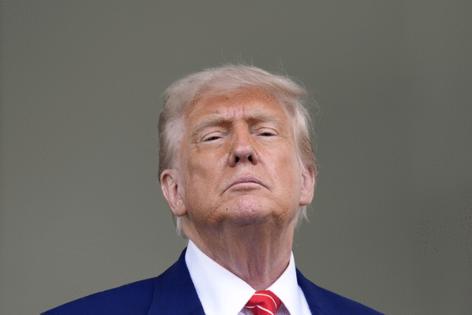Commentary: Trump is pitching austerity? Tough sell
Published in Political News
The war on Christmas came early this year — and from an unexpected source: Donald Trump. It’s only May, but he’s already laying the groundwork for empty shelves, wallets and stockings, all thanks to a tariff policy that could hit American consumers hard.
“Maybe the children will have two dolls instead of 30 dolls,” Trump shrugged recently at the end of a Cabinet meeting, “and maybe the two dolls will cost a couple of bucks more.”
Lest you think this Scrooge act was just another off-the-cuff remark, Trump doubled down, reiterating to “Meet the Press” host Kristin Welker: “I don’t think a beautiful baby girl — that’s 11 years old — needs to have 30 dolls. I think they can have three dolls or four dolls. They don’t need to have 250 pencils. They can have five.”
Look, I’m no fan of big-box consumerism. I’m closer to being a minimalist — the kind of person who twitches when a drawer won’t close. So I’m sympathetic to the notion that we’ve all got too much stuff.
But that’s my business; it’s not the president’s job to ration crayons and Barbies like we’re in wartime Britain.
So why is he saying this?
Trump’s rhetoric seems all about selling scarcity as a virtue — while pretending it’s some kind of noble character test for the American family. In short, we should be thanking him for this opportunity to sacrifice.
Again, there’s nothing wrong with parents setting limits or being frugal. But Trump isn’t your daddy. He’s the president. And the last time I checked, he got that job by promising to bring down prices “starting on Day 1.”
And let’s be honest, he’s not exactly the perfect messenger for austerity, anyway.
Think of the irony: A guy with a gold toilet is telling you to Marie Kondo your daughter’s wish list? That takes a lot of chutzpah. Sort of like Ozzy Osbourne telling you you’ve had enough to drink after two gin and tonics.
Imagine, just for a moment, if Barack Obama had said something like this. Or Mitt Romney. Or even George W. Bush. Fox News would have detonated. Glenn Beck would’ve whipped out the chalkboard for an interpretive monologue on the dangers of collectivism. The chyrons write themselves: “Dollgate!” “Central planning!” Sean Hannity would be screaming, “He wants to tell your kids how many stickers they can have!”
Remember how the nation really did react when President Jimmy Carter called out “self-indulgence and consumption,” and urged Americans to cut back? (His rival in his reelection campaign, Ronald Reagan, shrewdly tapped into Americans’ love of cheap consumer goods, asking voters: “Is it easier for you to go and buy things in the stores than it was four years ago?”)
Once upon a time, Carter’s message was political suicide. But because Trump is a cult of personality, nobody on the right seems to have noticed that Trumponomics has somehow veered into lefty territory — most recently exemplified by Bernie Sanders’ insistence that “you don’t necessarily need a choice of 23 underarm spray deodorants or of 18 different pairs of sneakers.”
Carter and Sanders were rebuked for good reason. But somehow, Trump gets to keep on posing as Reagan meets Santa Claus. This takes good marketing. And my guess is that, in typical Orwellian fashion, Trump’s administration is probably 15 minutes away from rebranding Trump’s two-doll allotment as a “Freedom Rationing.”
Which is crazy. Trump’s comments aren’t just opportunistic, hypocritical and paternalistic; they’re also un-American. Not in the flag-waving, bumper-sticker sense, but in the rugged individualist sense — the part of the American psyche that recoils when anyone in power starts telling you what you need.
Because at its core, what Trump is pushing is a tacit form of defeatism — he’s channeling Carter, just with less Sunday school and way more mistresses. “Don’t touch the thermostat. Put on a cardigan, kid. And make it last through college.”
On top of it all, “Dollgate” conflicts with the aspirational image that has served Trump well over the years.
But here’s the real problem: Trump isn’t just spinning some quirky yarn about kids and their overstuffed toy bins. He’s normalizing the consequences of his own bad policies.
His message isn’t about building character or the simple life; it’s about damage control. He’s trying to recast inflation as virtue, economic strain as moral clarity and consumer scarcity as character building.
Call me crazy, but I don’t think anyone is going to buy it. Americans will tolerate a lot of things, but less stuff isn’t one of them. And no amount of spin is likely to change that.
Because in the end, Trump’s problem isn’t that he’s talking like a thrift-store philosopher; it’s that he’s pushing economic policies that require rationalizing rationing.
Instead of lowering our expectations to fit his policies, he should simply change plans.
You want to spark joy, Mr. Trump? Start by giving the American people more choices — not fewer.
____
Matt K. Lewis is the author of “Filthy Rich Politicians” and “Too Dumb to Fail.”
©2025 Los Angeles Times. Visit at latimes.com. Distributed by Tribune Content Agency, LLC.



























































Comments